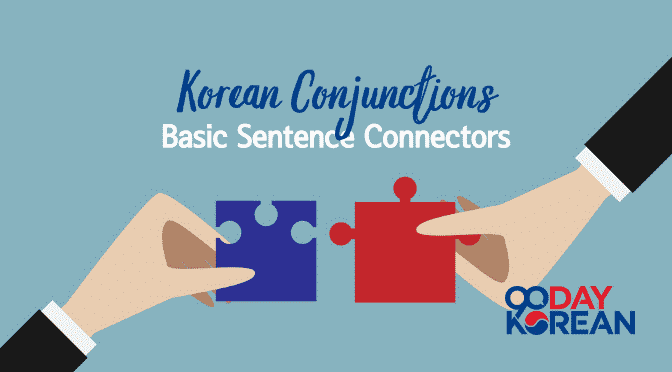Today we’re going to connect you with Korean conjunctions! These useful tools will help you express your ideas when talking, writing, or texting in Korean.
We’ll show you the common Korean conjunctions and sentence connectors that Koreans use on a daily basis.
Let’s get to it!

Simple Response in a Conversation
그래요, 그렇습니다 (geurae, geuraeyo, geureoseumnida) = OK, That’s right, Got it
This is a basic response in a conversation, in each level of politeness. We recommend using 그래요 (geuraeyo) since it’s considered polite but still good for everyday conversations.
그렇습니다 (geureoseumnida) is the formal version you might use at the office in a speech. You would use 그래 (geurae) with someone younger than you or someone who you’re on close terms with.
For example:
A: 우리 내일 5시에 만날까? (uri naeil 5sie mannalkka?)
Shall we meet tomorrow at 5:00?
B: 그래! (geurae!)
OK!
Sentence Connectors
그렇지만 (geureochiman) = But, however
The 그렇다 verb translates simply as “yes”. However, when you attach ~지만 (jiman) to its stem, you are forming a word that means “That’s correct, but…”, which you can then follow with the contradiction to what you are responding to.
For example:
오늘 친구랑 영화보러 가고 싶어요. 그렇지만 내일 시험 있어서 공부해야 해요. (oneul chingurang yeonghwaboreo gago sipeoyo. geureochiman naeil siheom isseoseo gongbuhaeya haeyo.)
I want to go see a movie with a friend today. However, I have an exam tomorrow so I have to study.
~지만 (geureochiman) = But, although
With this, you can unify the two sentences into one sentence.
For example:
오늘 친구랑 영화보러 가고 싶지만 내일 시험 있어서 공부해야 해요. (oneul chingurang yeonghwaboreo gago sipchiman naeil siheom isseoseo gongbuhaeya haeyo.)
Although I want to see a movie with a friend today, I have to study for an exam I have tomorrow.
그런데 (geureonde) = But, however, by the way
This one can also be used to form a contradiction, just like 그렇지만. However, it is better used to relate the two clauses with each other. It’s the form often used among friends. It can be used to change topics. The shortened form is 근데, with the same meaning.
For example:
어제 하루종일 잤어요. 그런데 오늘 피곤해요. (eoje harujongil jasseoyo. geureonde oneul pigonhaeyo.)
I slept all day yesterday. But today I am tired.
~ㄴ/는데 (~n/neunde) = But, however, though
Similarly to ~지만, with this you can directly connect the two sentences into one. Like this:
어제 하루종일 잤는데 오늘 피곤해요. (eoje harujongil jatneunde oneul pigonhaeyo.)
Though I slept all day yesterday I’m tired today.
그러나 (geureona) = But, or
This one is similar in meaning with 그렇지만 and 그런데. However, in comparison to the two, it is more formal and you’d most often see it used in literary or academic papers. Of all the Korean conjunctions on this list, this is the one you’ll most likely only see on paper.
~나 (na) = Or
With this, you can connect two nouns between which to choose.
For example:
오늘 뭘 먹을까? 고기나 치킨? (oneul mwol meogeulkka? gogina chikin?)
What shall we eat today? Meat or chicken?
~거나 (geona) = Or
This has the same meaning as the above, but it is used to connect two verbs.
For example:
수업이 끝나면 영화보거나 집에 갈 거예요. (sueobi kkeunnamyeon yeonghwabogeona jibe gal geoyeyo.)
When the class ends I will either watch a movie or go home.
아니면 (animyeon) = Or, unless, if not
You can use this similarly to the conjunctions ~나 and ~거나. For example, you can use it instead of ~나 or together with ~거나. You can also use it between two sentences to make them sound more natural.
For example:
고기를 먹을까요? 아니면 다른 거 먹을까요? (gogireul meogeulkkayo? animyeon dareun geo meogeulkkayo?)
Shall we eat meat? Or shall we eat something else?
그리고 (geurigo) = and, and then
You’ve already learned a few ways to say “and” from previous lessons, and here’s another way. Either use this to connect two nouns or as the beginning of another sentence that follows your first one.
For example:
슈퍼에서 우유를 사주세요. 그리고 계란도 사주세요. (syupeoeseo uyureul sajuseyo. geurigo gyerando sajuseyo.)
Please buy milk from the supermarket. And please buy eggs as well.
~고 (~go) = and, and then
This has a nearly identical meaning to 그리고 and is used to connect to actions together, typically in the form of “First X, and then Y”.
For example:
저녁을 먹고 샤워할 거예요. (jeonyeogeul meokgo syawohal geoyeyo.)
I’ll eat dinner and then take a shower.
그래서 (geuraeseo) = So, so that, thus, and so, therefore
The ~서 (seo) ending expresses cause and effect in the verbs it is attached to.
For example:
오늘 하루종일 남자친구한테서 연락을 못 받았어요. 그래서 슬퍼요. (oneul harujongil namjachinguhanteseo yeollageul mot badasseoyo. geuraeseo seulpeoyo.)
I didn’t receive any contact from my boyfriend all day today. Therefore I am sad.
~서 (seo) = Because
As mentioned above, this ending expresses cause and effect.
Like this:
오늘 사탕을 많이 먹어서 배가 아파요. (oneul satangeul mani meogeoseo baega apayo.)
My stomach hurts because I ate a lot of candy today.
그러니까 (geureonikka) = Therefore
This is very similar to 그래서. More so than 그래서, it emphasizes an action made as an effect of the cause.
For example:
그 날 가족과 함께 모일 거예요. 그러니까 생일파티에 못가요. (geu nal gajokgwa hamkke moil geoyeyo. geureonikka saengilpatie motgayo.)
I will do a get together with my family that day. Therefore, I cannot go to the birthday party.
~니까 (nikka) = Because of
Used largely in a similar fashion as ~서. Like, 그러니까, it focuses more on expressing the reason why something could not happen. It can be used in past tense.
For example:
하루종일 잤으니까 폰을 못 봤어요. (harujongil jasseunikka poneul mot bwasseoyo.)
I couldn’t look at my phone because I slept all day.
그러면 (geureomyeon) = If it’s so, in that case
You can use this to start a sentence that expands on information that’s been revealed to you previously in the conversation.
For example:
이번 일요일은 쉬는 날이에요? 그러면 그때 같이 밥을 먹어요. (ibeon illyoireun swineun narieyo? geureomyeon geuttae gachi babeul meogeoyo.)
This Sunday is a resting day? In that case let’s have a meal together then.
~면 (geureomyeon) = If, once
Attaching this to a verb, you can make a sentence saying you’ll do something if you first do X, or once you first do X.
For example:
집에 오면 연락할게요. (jibe omyeon yeollakalgeyo.)
I will contact you once I get home.
그래도 (geuraedo) = Nonetheless, even if, even so, but still, nevertheless
This is used to say something will be done or something will be happening, regardless of what is said in the first sentence.
For example:
어제 머리가 많이 아팠어요. 그래도 친구랑 놀러 갔어요. (eoje meoriga mani apasseoyo. geuraedo chingurang nolleo gasseoyo.)
My head hurt a lot yesterday. Even so, I went to play with a friend.
Hopefully learning these basic sentence connectors for Korean language is useful to advance your studies. Given them a try and write some example sentences using Korean conjunctions in the comments below!
The post Korean Conjunctions: Basic Sentence Connectors appeared first on 90 Day Korean®.
 Learn to read Korean and be having simple conversations, taking taxis and ordering in Korean within a week with our FREE Hangeul Hacks series: http://www.90DayKorean.com/learn
Learn to read Korean and be having simple conversations, taking taxis and ordering in Korean within a week with our FREE Hangeul Hacks series: http://www.90DayKorean.com/learn
Korean lessons * Korean Phrases * Korean Vocabulary * Learn Korean * Learn Korean alphabet * Learn Korean fast * Motivation * Study Korean


Recent comments